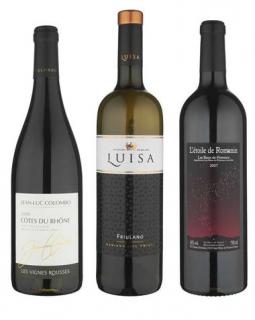Enter The Dragon 2 - Drinking Wine in China
POSTED ON 24/12/2011One of the keys to the dramatic expansion of wine in China was the result of Hong Kong’s newfound status as a global wine hub. On 27 February 2008, John Tsang, the Chief Financial Secretary of Hong Kong’s Treasury, announced the scrapping of the tax on wine in Hong Kong. With an estimated 350 importers today, and the proliferation of air-conditioned warehouses, Hong Kong has become a major supplier of fine wine, both legally and illicitly (China’s duty is 48 per cent to Hong Kong’s zero) to China.
Mainland China is a tougher nut to crack than Hong Kong. Only an estimated 11 per cent of China’s middle class drinks wine, but there’s been a dramatic rise in consumption from practically zero in 1995 to more than 20 million cases. The forecast is for 50 to 100 million wine drinkers and 100 million cases of wine imported within a decade. As an illustration of the speed of change, champagne exports alone virtually doubled last year from 48,000 to 92,000 cases.
The best wines are imported and dominated by France and Australia with Bordeaux still the wine of choice as a gift for the Chinese New Year. Until recently top Bordeaux, with Château Lafite the standout wine, has made all the running among China’s super-rich. Following Acker Merrall Condit’s £9 million auction in November, the word on the street is that Burgundy, albeit with a smaller range, is the next Great Leap Forward.
There’s also a shift occurring in where and how wine is sold in China. There are at least three main geographical markets: Beijing, Shanghai and the south around Guangzhou. The notion of quality and value is relatively recent but as China increases the prices of its own fancily-dressed premium wines, Chinese perception of an acceptable price for a premium wine, whether home-grown or imported, is changing.
According to Don St. Pierre, head of importer ASC, the number of licensed wine importers in China has risen from 1,000 a few years back to 20,000 today. Imported wine was distributed only in primary cities like Beijing, Shanghai, Guangzhou and Shenzhen and sold almost exclusively to foreign hotels and retailers. It was viewed as too expensive and wine was generally considered simply too hard to understand.
Today imported wines are entering major interior cities mainly through Chinese restaurants and large Chinese-owned supermarkets and department stores. The speed at which China is learning about wine has taken the global wine industry by surprise. Education is greatly valued in China and since consumers are receptive to learning about wine, distributors regularly organise wine seminars in smaller cities to teach customers how to appreciate wine.
With this growing sophistication, China’s wine drinkers are starting to drink varietal wines and brands. South Africa for instance has grown from selling 20,000 cases in 2005 to 250,000 cases last year. There are obviously huge opportunities for South Africa, Chile and Australia because they sell their wines on brand name, grape variety and quality.
Indeed domestic producers will need to pull up their socks if importers aren’t to continue to take a larger share of the market. And while cabernet may be emperor today, white wine and pinot noir are seen as most likely to go well with the diversity of Chinese cuisine. So the challenge of the next decade is narrowing the gap still further between price and prestige and expanding that of taste and value.
 Something for The Last Minute
Something for The Last Minute
Something for The Last Minute
Under £6
2009 Côtes du Rhône 'Les Vignes Rousses', Jean-Luc Colombo
Vivid and peppery, this bright southern Rhône blend displays an intense damson fruit quality with a lively suppleness of texture that’s immensely satisfying thanks to a mellowing touch of oak. £7.99, buy 2 = £5.99. Majestic.
Under a Tenner
2010 Tenuta Luisa, Friulano del Friuli
An intriguing north-east Italian dry white made from the Friulano grape that’s bone dry, richly full-bodied and distinctly nutty with no interference from oak, and, effortlessly made for fish and chicken. £9.99, down from £12.99, Waitrose, until 3 January.
Splash Out
2007 Château Romanin Les Baux de Provence, L'Etoile de Romanin
Spice-scented Provence red whose vivid dark berry fruit and plum flavours are infused with pepper, olive and herb and defined by a juicy fresh suppleness. A match for turkey or game. £13.99, Marks & Spencer.

